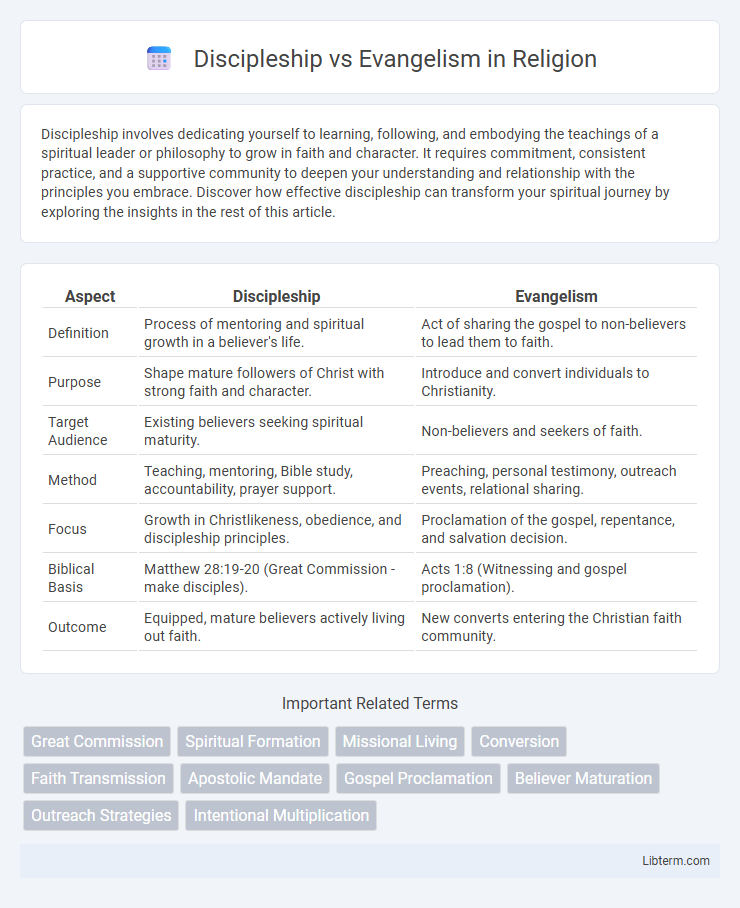Discipleship involves dedicating yourself to learning, following, and embodying the teachings of a spiritual leader or philosophy to grow in faith and character. It requires commitment, consistent practice, and a supportive community to deepen your understanding and relationship with the principles you embrace. Discover how effective discipleship can transform your spiritual journey by exploring the insights in the rest of this article.
Table of Comparison
| Aspect | Discipleship | Evangelism |
|---|---|---|
| Definition | Process of mentoring and spiritual growth in a believer's life. | Act of sharing the gospel to non-believers to lead them to faith. |
| Purpose | Shape mature followers of Christ with strong faith and character. | Introduce and convert individuals to Christianity. |
| Target Audience | Existing believers seeking spiritual maturity. | Non-believers and seekers of faith. |
| Method | Teaching, mentoring, Bible study, accountability, prayer support. | Preaching, personal testimony, outreach events, relational sharing. |
| Focus | Growth in Christlikeness, obedience, and discipleship principles. | Proclamation of the gospel, repentance, and salvation decision. |
| Biblical Basis | Matthew 28:19-20 (Great Commission - make disciples). | Acts 1:8 (Witnessing and gospel proclamation). |
| Outcome | Equipped, mature believers actively living out faith. | New converts entering the Christian faith community. |
Understanding Discipleship and Evangelism
Discipleship involves guiding individuals to grow deeper in their faith through teaching, mentorship, and spiritual formation, emphasizing relationship-building and long-term commitment. Evangelism focuses on sharing the gospel message to lead non-believers to faith in Christ, often centered on outreach and conversion. Understanding the distinct roles highlights discipleship as ongoing spiritual growth and evangelism as the initial proclamation of faith.
Key Differences Between Discipleship and Evangelism
Discipleship focuses on nurturing and deepening the faith of new believers through ongoing teaching, mentorship, and spiritual growth, while evangelism aims at sharing the gospel message to lead non-believers to faith in Christ. Discipleship emphasizes long-term transformation and obedience to Christ's teachings, whereas evangelism centers on initial conversion and outreach. The key difference lies in discipleship's role in developing mature Christians, contrasting with evangelism's goal of introducing individuals to the Christian faith.
Biblical Foundations of Discipleship
Discipleship, rooted deeply in Matthew 28:19-20, emphasizes teaching and nurturing believers to obey Christ's commandments and grow in spiritual maturity, contrasting with evangelism's primary focus on sharing the gospel to initiate faith. Biblical foundations highlight Jesus' model of investing in twelve disciples, illustrating a relational process of transformation and ongoing mentorship. The Great Commission mandates both evangelistic outreach and intentional discipleship for the church's holistic mission and spiritual multiplication.
Scriptural Basis for Evangelism
Evangelism is deeply rooted in Scripture, with Jesus' Great Commission in Matthew 28:19-20 explicitly calling believers to "go and make disciples of all nations." The Apostle Paul's mission to spread the Gospel to both Jews and Gentiles, as seen in Acts 13:47, underscores the directive to evangelize beyond the immediate faith community. Throughout the New Testament, evangelism serves as the foundational step in bringing individuals to faith, enabling the ongoing process of discipleship to mature new believers in Christ.
The Role of Relationship in Discipleship
The role of relationship in discipleship is foundational, as it fosters trust, accountability, and spiritual growth through personalized guidance. Discipleship involves intentional, ongoing mentorship where relational bonds enable deeper understanding and application of biblical teachings. Unlike evangelism's primary focus on sharing the gospel message, discipleship emphasizes nurturing a transformative connection that cultivates mature faith and obedience.
Evangelism: Spreading the Good News
Evangelism centers on proclaiming the Good News of Jesus Christ to unbelievers, emphasizing the message of salvation and hope. It involves actively sharing the gospel through various methods such as preaching, personal testimony, and outreach events to inspire faith. The core objective of evangelism is to bring individuals into a saving relationship with Christ, laying the foundation for discipleship and spiritual growth.
Discipleship: Building Deep Roots of Faith
Discipleship emphasizes nurturing a profound and ongoing relationship with Christ through biblical teaching, prayer, and community fellowship, fostering spiritual growth and maturity. It involves intentional mentoring and accountability, equipping believers to live out their faith authentically in everyday life. Unlike evangelism's focus on sharing the gospel message, discipleship prioritizes establishing deep roots of faith that sustain long-term transformation and Christlike character.
How Evangelism Leads to Discipleship
Evangelism initiates the spiritual journey by sharing the gospel message, inviting individuals to embrace faith in Christ. As new believers accept salvation, evangelism naturally transitions into discipleship, which involves teaching, mentoring, and nurturing spiritual growth. This progression ensures that converts not only believe but also become mature followers equipped to live out and spread their faith.
Balancing Evangelism and Discipleship in Ministry
Balancing evangelism and discipleship in ministry requires integrating the urgent call to share the gospel with the long-term commitment to spiritual growth and maturity. Effective ministry strategies prioritize clear evangelistic outreach while ensuring new believers receive consistent discipleship through Bible study, mentorship, and community support. This dynamic equilibrium fosters a healthy church environment where converts become faithful followers who actively engage in evangelistic efforts themselves.
Strategies for Effective Discipleship and Evangelism
Strategies for effective discipleship emphasize intentional mentorship, biblical teaching, and consistent personal growth through small group interactions, fostering deep spiritual maturity. Evangelism strategies prioritize clear, culturally relevant communication of the gospel, utilizing relational connections and community engagement to reach diverse audiences. Integrating both approaches involves balancing relational discipleship with proactive outreach, ensuring new believers are nurtured while expanding the faith community.
Discipleship Infographic

 libterm.com
libterm.com